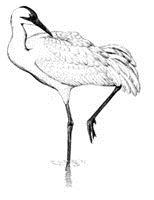North American Crane Working Group

Proceedings of the North American Crane Workshop
Date of this Version
2005
Document Type
Article
Citation
Dusek, R.J., M.G. Spalding, D.J. Forrester, N. Komar, and J.F. Day. Morbidity and mortality factors in pre-fledged Florida sandhill crane (Grus Canadensis Pratensis) Chicks. In Chavez-Ramirez, F, ed. 2005. Proceedings of the Ninth North American Crane Workshop, Jan 17-20, 2003. Sacramento, California: North American Crane Working Group. Pp. 7-14.
Abstract
One hundred and fifteen Florida sandhill crane (Grus canadensis pratensis) chicks were captured in Osceola and Lake Counties, Florida in 1998 - 2000 and examined for evidence of disease. Evidence of Eimeria gruis and/or E. reichenowi infection was found in 52% of chicks examined. Ten chicks were positive for antibodies to St. Louis encephalitis virus and 1 of these chicks was also positive for antibodies to eastern equine encephalitis virus. Predation was the most commonly identified cause of mortality. An unidentified microfilaria, and an unknown protozoan were detected in blood smears from crane chicks. A number of other disease conditions were also encountered, including: ant bites, chigger infestations, helminth infections, bacterial infections, leg problems associated with capture, and a bill deformity.
Included in
Behavior and Ethology Commons, Biodiversity Commons, Ornithology Commons, Population Biology Commons, Terrestrial and Aquatic Ecology Commons


Comments
Reproduced by permission of the NACWG.